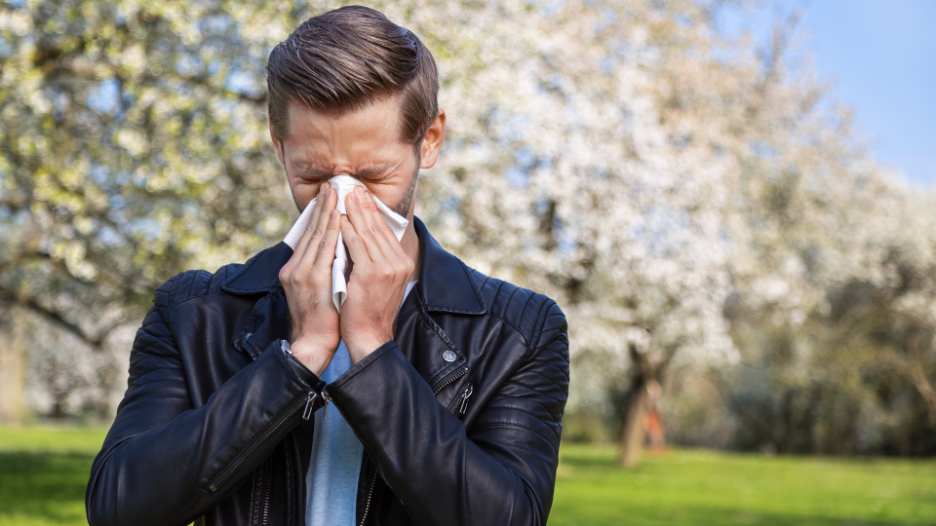
Tree pollen allergy symptoms: recognizing the telltale signs
The beauty of springtime, with its blooming trees and vibrant flowers, is a nice change of pace from months of cold weather. But for many of us, this season also brings something less pleasant — tree pollen allergies. As the trees release their tiny pollen particles into the air, our immune systems can go haywire, triggering uncomfortable symptoms.
If you find yourself sneezing, itching, or experiencing other bothersome reactions this allergy season, you're likely dealing with tree pollen allergy symptoms.
Understanding tree pollen allergies
So, what exactly are tree pollen allergies?
Tree pollen allergies occur when our immune systems overreact to the pollen released by blooming trees during spring. This immune response triggers the release of chemicals like histamines, leading to uncomfortable symptoms. Common trees like oak, birch, maple, cedar, and pine can be the causes, depending on your location.
While tree pollen allergies can be bothersome, the good news is that there are ways to manage and alleviate your symptoms.
Common tree pollen allergy symptoms
Now that we understand tree pollen allergies better let's discuss the common symptoms to watch out for.
- Sneezing. Frequent, repetitive sneezing is a classic symptom of tree pollen allergies. If you find yourself reaching for a tissue more often than usual during the spring months, it could be a telltale sign.
- Itchy, watery eyes. Do your eyes feel like they're constantly irritated, itchy, and watery? Tree pollen allergies can often trigger these uncomfortable eye symptoms, making you wish for relief.
- Runny or stuffy nose. Are you dealing with a perpetually runny or congested nose? Tree pollen can cause your nasal passages to become inflamed, leading to a stuffy or runny nose, making breathing a bit more challenging.
- Scratchy throat and cough. If you find yourself clearing your throat frequently or experiencing a persistent, dry cough, it could be due to tree pollen allergies. The pollen particles can irritate the throat, triggering these symptoms.
- Fatigue and general discomfort. Allergies can leave you feeling tired, drained, and generally unwell. If you notice a lack of energy, accompanied by overall discomfort during the spring season, it may be attributed to tree pollen allergies.
It's important to note that these symptoms can overlap with other conditions, so consulting with a healthcare professional at your local CityMD is recommended for an accurate diagnosis.
Managing tree pollen allergy symptoms: treatment options
There are several treatment options available to help you manage and find relief from your tree pollen allergy symptoms. Here are some strategies you can try.
- Over-the-counter medications. Antihistamines, available in oral or nasal spray form, can help alleviate sneezing, itching, and runny nose caused by tree pollen allergies. Non-drowsy options are also available, allowing you to go about your day without feeling excessively tired.
- Nasal irrigation. A saline solution or a neti pot can help clear out pollen particles from your nasal passages, reducing congestion and providing relief. Make sure to use sterile or distilled water to avoid any potential risks.
- Allergy eye drops. If you're experiencing itchy, watery eyes, over-the-counter allergy eye drops can provide quick relief and soothe the irritation.
- Avoiding pollen exposure. While it may not be possible to avoid tree pollen altogether, there are steps you can take to minimize your exposure. Keep windows closed during high pollen days, use air purifiers with HEPA filters indoors, and avoid spending extended periods outside, especially during peak pollen times.
- Wear protective gear. When you need to be outdoors, wearing sunglasses can help protect your eyes from pollen, and a hat can prevent pollen from settling in your hair. Additionally, consider changing clothes and showering after spending time outdoors to remove any lingering pollen particles.
- Visit CityMD. If your symptoms are severe or significantly impacting your daily life, stop by your local CityMD urgent care. They can provide personalized advice, prescribe medications, or discuss other treatment options.
Remember, finding the right combination of treatments may require some trial and error, as each individual's response to treatment can vary. What works for one person may not be helpful for another.
Treating tree pollen allergy symptoms at CityMD
At CityMD, we understand the impact that tree pollen allergies can have on your well-being, and we're here to help you breathe better and find relief.
With over 170 locations open 365 days a year, our providers are ready to give you the care you need. Whether you require rapid evaluation for asthma or allergy attacks, treatment options like antihistamines or steroids, medication refills for nebulizers or inhalers, or referrals to allergy and immunology or pulmonology specialists, you can rely on the CityMD in your neighborhood for quick and easy urgent care.
While we don't offer allergy testing, we can connect you with the right specialists for comprehensive follow-up care. Let us be your partner in managing your allergies and asthma, so you can enjoy life to the fullest.
Walk right in and breathe easier today with CityMD.

We’re ready to care for you.
Visit any CityMD urgent care location in your community today for an evaluation with one of our expert providers.